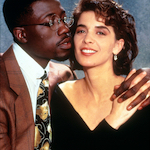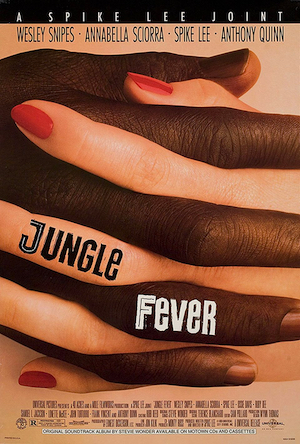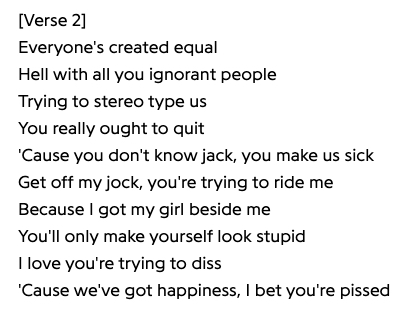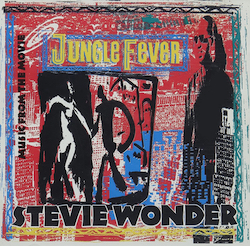 June 7, 1991
June 7, 1991
JUNGLE FEVER is five films and five years into the career of Spike Lee. You have the financed-on-credit-cards debut SHE’S GOTTA HAVE IT, the polished studio debut SCHOOL DAZE, the explosion of DO THE RIGHT THING, the follow up MO’ BETTER BLUES, and then this. Like all of his movies it’s interesting and bold and full of greatness but in my opinion, especially in retrospect, it’s his first fumble. That’s fine. He did MALCOLM X next.
 It is the story of possibly the most only-Spike-Lee-would-ever-name-a-character-this character of all time, Flipper Purify, played by Wesley Snipes, who had been in Lee’s MO’ BETTER BLUES and was coming off of the success of NEW JACK CITY. He’s an upper class architect, living in Harlem with his wife Drew (Lonette McKee, BREWSTER’S MILLIONS, ‘ROUND MIDNIGHT), and things seem to be going well from the hot morning sex that opens the movie (the sounds of which greatly amuse their daughter Ming [Veronica Timbers]).
It is the story of possibly the most only-Spike-Lee-would-ever-name-a-character-this character of all time, Flipper Purify, played by Wesley Snipes, who had been in Lee’s MO’ BETTER BLUES and was coming off of the success of NEW JACK CITY. He’s an upper class architect, living in Harlem with his wife Drew (Lonette McKee, BREWSTER’S MILLIONS, ‘ROUND MIDNIGHT), and things seem to be going well from the hot morning sex that opens the movie (the sounds of which greatly amuse their daughter Ming [Veronica Timbers]).
From what he says, Flipper pretty much built his firm from the ground up, though his weasely white bosses (Tim Robbins and Brad Dourif) are not making good on a promise to make him their partner. He’s also pissed because when his secretary left they replaced her with a white lady, Angie Tucci (Annabella Sciorra, THE HARD WAY), from Bensonhurst. And he’s a dick to her until one night they both stay in the office late, get to talking, order Chinese food. It’s a really effective sequence, time passing through slow fades to black, the camera staying close on their faces until finally pulling back to show all the room in the office not being occupied because they’re huddled so close together. Then he tells her he’s happily married, she almost leaves, but he says “Wait” and fucks her on his drafting desk.
 His number one mistake is violating his marital vows and number one B is telling his best friend Cyrus (Spike Lee, LISA PICARD IS FAMOUS). Next thing you know he comes home and the whole neighborhood is watching Drew throw all his clothes and files out the window while screaming things like “Flipper Purify, there will be no penis between us!” Flipper and Cyrus go for a walk in one of those trademark Lee shots where they look like they’re floating, and Flipper realizes that Cyrus told his wife (Veronica Webb, later in 54) and she told Drew. Although it’s comical how quickly Cyrus betrayed him, Cyrus is also correct that he couldn’t keep that from his wife and obviously his wife can’t not tell her friend that her piece of shit husband cheated on her. Yes, this all falls on Flipper here.
His number one mistake is violating his marital vows and number one B is telling his best friend Cyrus (Spike Lee, LISA PICARD IS FAMOUS). Next thing you know he comes home and the whole neighborhood is watching Drew throw all his clothes and files out the window while screaming things like “Flipper Purify, there will be no penis between us!” Flipper and Cyrus go for a walk in one of those trademark Lee shots where they look like they’re floating, and Flipper realizes that Cyrus told his wife (Veronica Webb, later in 54) and she told Drew. Although it’s comical how quickly Cyrus betrayed him, Cyrus is also correct that he couldn’t keep that from his wife and obviously his wife can’t not tell her friend that her piece of shit husband cheated on her. Yes, this all falls on Flipper here.
Meanwhile in Bensonhurst Angie lives with her dad (Frank Vincent, STREET HUNTER) and shitty adult brothers Charlie (David Dundara) and Jimmy (Michael Imperioli, LEAN ON ME) and is expected to cook dinner for them every night even though Jimmy complains right in front of her that he liked their late mother’s cooking better. Her brothers also relentlessly bully her long time boyfriend boyfriend Paulie (John Turturro, TO LIVE AND DIE IN L.A.) for being quiet and nice instead of just an obnoxious shitbag waving his dick around yelling epithets and grabbing asses, as is the neighborhood standard. They say weird possessive things to him like, “If we ever hear she’s not a virgin anymore your ass is grass.” (He correctly responds, “You guys are sick.”)
The movie opens with a dedication to Yusuf Hawkins, a Black teenager who was killed in Bensonhurst after going to inquire about a used car for sale and being attacked by 10-30 racist white kids waiting with baseball bats to attack Black kids coming to a white girl’s party. One of the white characters here even wears a t-shirt saying “Free Fama,” meaning the guy convicted of firing the shots that killed Hawkins.
That event happening in this neighborhood only 2 years prior sort of goes against my hope that Lee went over-the-top in his stereotyping of the locals as the most despicable macho shitbags you never want to meet in your life. Paulie runs his dad’s little newstand/cafe and has to spend his day trying to ignore the disgusting hate that spews out of their dumb mouths. Turturro gets to do a reverse of the scene in DO THE RIGHT THING where his character Pino tries to separate his love for Prince and Michael Jackson from his hatred of Black people. Here, racist Frankie (Michael Badalucco, who also played the construction worker hitting on Ellen Barkin in SWITCH) says that he listens to Public Enemy.
Sometimes their dumb talk is funny, like when the very concept of reading is called into question: “Every day I see you reading. What is this reading? Some guy makes up some story? Fuck him.”
But also they complain about how “They took over sports,” and that there’s a Black mayor and police commissioner. Paulie demolishes an attempt to tie New York mayor David Dinkins to completely separate person Washington DC mayor Marion Barry. And 30 years later it’s interesting to hear these racist characters brag about voting for their boy “Rudy,” though they have no rebuttal when Paulie says they’re not registered and have never voted in their lives.
(I should note that Paulie is not up to 2021 levels of enlightenment. There’s a scene where he’s being charming while saying the r-word over and over again.)
Both Flipper’s friends and Angie’s friends are kind of amused and intrigued when they hear about their friend cheating, then flip out when they find out the race of the person. (Exception: Debi Mazar [Graffiti Rock] as Denise says, “Hey look, this is the ‘90s, there’s nothing wrong with it.”) The prioritizing race over fidelity plays to me like a commentary on the values of these characters, but maybe it’s not when you consider the scene where, after learning of the affair, Drew is surrounded by her friends venting about the situation (a scene Cyrus calls “a war council”).
It’s kind of a thrilling scene because you can see it untethering from the reality of the movie and turning into this other thing where these women get several minutes to unleash their opinions about race and relationships. According to a New York Times article from the time it was rehearsed for almost three days, filmed for a full day, improvised and edited down from two hours of footage. I remember at the time Lee was given credit for offering this chance for different female perspectives in one of his movies. It’s obvious that much of it is very personal, with all kinds of anger about Black men being attracted to light skinned women and white women.
I’m not qualified to judge, but in the context of the story, and from my outsider’s perspective, some of it sounds pretty ignorant! “Most of them are homos, drug addicts or in jail. The good ones know they the shit, so they see ten women at a time, leaving babies all over the place.” That could be switched out with dialogue for Pino in DO THE RIGHT THING or Frankie in this one.
After several minutes of the round table Drew says, “You know somethin though? It don’t even matter what color she is. My man is gone.” Which – yes, exactly, I wish you’d have focused your fury on the specific husband who wronged you before unloading on all Black men, white women and “homos.”
Okay you’re right, I’ll stay out of this one.

But I do think this movie overall has major issues that have to do with Lee’s own issues with interracial relationships. Obviously our sympathies lie with the couple when they’re being treated like shit by everybody – Angie’s dad straight up assaults her while yelling the n-word over and over again, and Paulie’s friends beat the shit out of him for asking out a Black customer he likes (Tyra Ferrell, THE MIGHTY QUINN, BOYZ N THE HOOD). Even the title seems like a hint – a term that plays off of archaic racist ideas, so you’d think it’s being used sarcastically. Also, in the title song by Stevie Wonder he sings “We’ve got jungle fever, we’re in love.” Stevie is a sincere man. He doesn’t sing “we’re in love” lightly.
But in the movie Flipper and Angie are not in love. Their one time fling only continues after they’re kicked out by their families and decide to get an apartment together. It never seems particularly loving. I think Flipper is supposed to be grasping at straws when he swears he’s still very down, progressive and pro-Black despite having sex with a white woman, and when he defends the relationship as “very complex.” At the end Flipper tells Angie, “You just got with me to spite your family because you were curious about Black.”
When she asks, “Is that what you think?” my feeling is that from what we see in the movie, and from the way Sciorra plays it, Flipper is wrong. Of course she’s not “trying to spite her family,” and whether or not she was curious about Black men, her feelings were genuine, so he’s being a fucking asshole by saying that to her. But she doesn’t say that, and I think that’s because Lee believes Flipper is right.
Characters can have whatever flaws their creators wish and encounters like that surely do happen sometimes, but for Lee to make a movie “about interracial relationships” as if it’s an issue to be addressed and then to make it about how people of different races only get together because of racist sexual myths, that’s just some ugly, backwards shit, and I’m ashamed that my love for Lee and his filmmaking made me give it more credit than that at the time. I remember some reviewer saying that the sweetness of Paulie dating Orin shows the movie wasn’t necessarily entirely against interracial relationships, but fuck that.
It reminds me of a great point Mr. Majestyk once made in the comments of some vigilante movie I reviewed. He noted how these movies always act like they’re showing both sides of the vigilante issue, but of course going around killing people is definitely wrong, so there’s no actual value to repeatedly exploring a range of opinions on the topic. Same thing here – of course people of different races can and do fall in love, and if you question the motives of these relationships, whether you’re a genius filmmaker like Lee or the historic bad guys of LOVING, I invite you to call 1-800-EAT-SHIT to voice your concerns. Our operators are standing by to tell the very idea of a but actually, just asking questions, devil’s advocate message movie “about interracial relationships” to fuck off.
An aspect of this I did not know until many years later is that around this time Lee had a falling out with his father Bill Lee, who scored his first four movies but was replaced by Terence Blanchard here. The elder Lee later told New York Newsday that his son held it against him that he had remarried to a white woman and that JUNGLE FEVER was “directly talking about me and my wife in a negative way.”
So that’s my biggest problem with JUNGLE FEVER, but I also think it’s one of Lee’s least focused movies. I haven’t yet mentioned the odd choice to also make this a movie about crack addiction, which doesn’t seem any more organic after 30 years of sitting with it. Flipper has an older brother named Gator (Samuel L. Jackson) who’s always asking for money, and Flipper has to go find him when he steals their parents’ TV. And this is the climax of the movie.
Like the other part of the movie, there’s much about this that’s really interesting and well done. Jackson had already been in GOODFELLAS and played Mr. Senor Love Daddy in DO THE RIGHT THING, but this was the breakout that led to JURASSIC PARK and PULP FICTION and then being Samuel L. Jackson. And it was kind of destined, because he’d been addicted to heroin and then crack, and had gotten out of rehab about a week before shooting.
It’s a memorable role because he’s pathetic and disconcertingly antsy, but also funny and kind of charming. Flipper shows him little to no sympathy, and he doesn’t really ask for any, but he’s kind of likable. His frequent random dancing is both charming and a little upsetting. Flipper has to search for him in a nightmarish (I hope very exaggerated?) crackhouse called the Taj Mahal – basically, a place the size of a school gym filled with people smoking crack.
This is also the film debut of Halle Berry, playing Gator’s new girlfriend Vivian. She’s very good and unlike the Halle Berry we’re now familiar with, cursing up a storm. In her most famous scene she runs into Flipper while he’s walking Ming to school and offers to suck his dick for two dollars. Flipper is so horrified by the idea of his daughter turning into that that he almost gets run over, then yanks on her arm, then the movie actually ends on a scene where he imagines her as an adult saying the same thing to him and it zooms in on his face as he yells “NNNNNOOOOOOOOO!!!”
It was obviously the inspiration for the Darth Vader scene in REVENGE OF THE SITH and it’s so goofy that in the trailer they put it in a different context to play as a joke.
I suppose the drug topic is woven into the main part of the movie in a few random comments. When Cyrus hears that he had an affair with a white woman, he yells “ARE YOU ON CRACK?” Angie’s friends deride someone killed by racists in their neighborhood (Hawkins?) as a “Puerto Rican crackhead.” And Vinny (Nicholas Turturro, MEN OF RESPECT), when confronted with a cousin being a crackhead, defensively corrects that he’s on methadone, after being on heroin.
I seem to remember that when DO THE RIGHT THING came out a bunch of fucking white people un-self-consciously asked in major publications why it was about Black people but they weren’t smoking crack. A piece in Rolling Stone describes some dipshit asking about it at a press conference:
Someone asks why drugs are never mentioned in the film. “This film is not about drugs,” says Lee. “It’s about people and racism. Drugs are at every level of society today in America. How many of you went and saw Working Girl or Ram Man [sic] and asked, ‘Where are the drugs?’ Nobody. But the minute we have a black film that takes place in the ghetto, people want to know where the drugs are…because that’s the way you think of black people. I mean, let’s be honest.”
It’s so infuriating, it’s like the Republicans now who have been trained to ask anyone discussing racial justice issues “What about Black-on-Black crime?,” as if the vast majority of crime wasn’t within the same race; as if any white person ever in history wasn’t allowed to discuss an issue they cared about until they first solved the problem of white people committing crimes against white people. So it kind of bummed me out that Lee did make a movie about a crackhead and it didn’t even seem like it really belonged with this – it’s kind of crammed together haphazardly. Okay, white people, I’ll give you your crackhead movie but it’s also my “my Dad shouldn’t have married a white lady” movie.
The connection between the two stories, besides the two being brothers, is that both have to deal with their parents, whose apartment does not have a nautical or aquatic theme that would explain naming their children after sea creatures. The Good Reverend Doctor and Lucinda are played by Ossie Davis and Ruby Dee, so your first instinct is to love them. But The Good Reverend Doctor (as even his sons call him) is kind of a crazy asshole who was ousted from his church Hard Rock Baptist for unspecified stubbornness. Lucinda is sweeter and has a soft spot even for giving Gator money, but she seems very damaged.
There’s a very effective, uncomfortable scene where Flipper and Angie come over for dinner, and Lucinda is very friendly until she suddenly blurts out, “Well has Flipper told you about his loving wife and daughter?” and then goes into the kitchen to wildly gesture and mutter to herself. Then The Good Reverend Doctor goes off on a wild speech about interracial sexual attraction (he’s only one of the characters in the movie with a vast knowledge of archaic terms for mixed race). He tells Angie, “I feel sorry for you. Here it is the nineties, still tryin to make up for what you missed out on,” with “you” in this case being the wives of slavemasters who were attracted to slaves but didn’t get to rape them like their husbands did. I like the irony that Angie’s friend invokes the new decade as a reason to not be racist and Dad here uses it in a different way.
Other actors who show up briefly who I haven’t mentioned yet: Queen Latifah in her movie debut (HOUSE PARTY 2 came out in October) as a waitress who doesn’t want to help an interracial couple, and Charlie Murphy (previously in MO’ BETTER BLUES) in one scene as “Livin’ Large.” I like that he’s wearing a jacket with the security tags still attached. You may have noticed Gina Gershon and Ileana Douglas in that trailer, but they’re not in the movie. Oh man, if there was a white version of the “war council” that must’ve been brutal!)
 Stevie Wonder had previously done soundtracks for THE SECRET LIFE OF PLANTS (1979) and THE WOMAN IN RED (1984), but it still seemed like a big deal for him to do the original songs here (his first album since Characters in 1987). It’s not his best album, but it’s all pretty good, and being that I consider him pretty much the greatest musical artist of our time I enjoy the conceit that everywhere they go there are Stevie Wonder songs playing. I’d say the best songs are the title track, “Gotta Have You,” and the ballads “These Three Words” and “Make Sure You’re Sure.” But actually the most notable song in the movie is the classic “Living For the City” from Innervisions, which is used (almost?) in its entirety during the Taj Mahal scene.
Stevie Wonder had previously done soundtracks for THE SECRET LIFE OF PLANTS (1979) and THE WOMAN IN RED (1984), but it still seemed like a big deal for him to do the original songs here (his first album since Characters in 1987). It’s not his best album, but it’s all pretty good, and being that I consider him pretty much the greatest musical artist of our time I enjoy the conceit that everywhere they go there are Stevie Wonder songs playing. I’d say the best songs are the title track, “Gotta Have You,” and the ballads “These Three Words” and “Make Sure You’re Sure.” But actually the most notable song in the movie is the classic “Living For the City” from Innervisions, which is used (almost?) in its entirety during the Taj Mahal scene.
JUNGLE FEVER won Jackson best supporting actor at the Cannes Film Festival (but no Oscar nominations) and he was singled out for praise in most of the reviews, which were overall positive. And the movie did well, opening at #3 (below CITY SLICKERS and BACKDRAFT) and ultimately making almost three times its budget. According to this chart it’s his third highest grossing movie adjusted for inflation – below INSIDE MAN and MALCOLM X, above THE ORIGINAL KINGS OF COMEDY, DO THE RIGHT THING and BLACKKKLANSMAN.
Trivia: There was also a 1989 episode of The Super Mario Bros. Super Show called “Jungle Fever,” but it’s about a witch doctor and itching powder, not interracial relationships. In the live action part of the episode, Mario gets Luigi a dance lesson from Shabba-Doo from BREAKIN’ and BREAKIN’ 2 as a birthday present.

